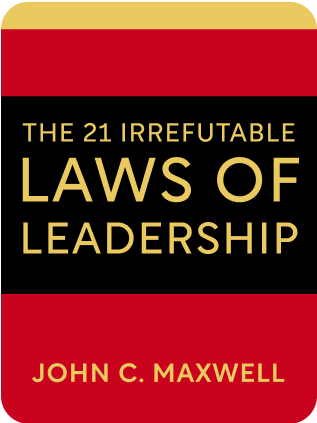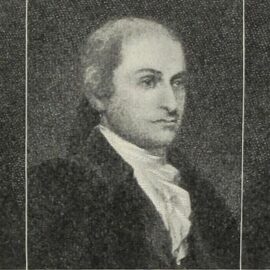

This article is an excerpt from the Shortform book guide to "The 21 Irrefutable Laws Of Leadership" by John C. Maxwell. Shortform has the world's best summaries and analyses of books you should be reading.
Like this article? Sign up for a free trial here .
What is The 21 Irrefutable Laws of Leadership about? What are the most important components of leadership, according to its author John C. Maxwell?
In The 21 Irrefutable Laws of Leadership, John C. Maxwell shares what he’s learned from his lifelong study of leadership. There’s more to leadership than being in charge or having a title, and the 21 laws cover influence, trust, and the importance of serving others.
Here is a brief overview of the book The 21 Irrefutable Laws of Leadership by John C. Maxwell.
John C. Maxwell: The 21 Irrefutable Laws of Leadership
For a leader, success means achieving your vision. Following the laws will help you develop into the kind of person who can get things done.
The laws of leadership are broadly applicable. You can use them in any context, whether professional or personal.
There are several important things to consider when studying the laws:
- You can learn all of the laws. You may be naturally more comfortable with some than others, and some are easier or harder to learn, but they’re all attainable.
- To be an effective leader, you must apply all of the laws.
- That said, no one’s going to be perfect at all 21.
- You don’t need to learn all the laws at once. They complement each other, but learning even one makes you a better leader.
- Create a leadership team of people who have diverse and complementary skills. Choose people who are good at the laws you’re not.
- You can’t ignore the laws. Choosing to apply them (or not) comes with consequences. Applying the laws will give positive results, ignoring or disobeying them will create problems.
- Learning the laws is only the first step to becoming a better leader. All of the laws require practice.
Here are the 21 irrefutable laws. (Shortform note: For the sake of clarity, we’ve grouped the laws by theme. Because each is independent, you don’t need to follow them in order.)
Laws of Human Nature
These laws describe universal truths about the way the world works.
Law #1: Leaders Are Capped by Their Leadership Ability. If you’re not a good leader, no matter how good you are at anything else, you’ll never reach your full potential.
Law #7: Leaders Are Respected, and People Follow the Strongest and Most Respected Leader. By nature, people follow those who they respect, and those who are stronger than themselves. If there is more than one leader vying for followers, the followers (and weaker leaders) will flock to the strongest leader.
Law #9: Leaders Attract People Similar to Themselves. People are drawn to people who are similar to themselves. Therefore, leaders attract other leaders.
Law #13: Leaders Lead by Example. By nature, followers copy the behavior and values of their leaders. Leaders demonstrate the path to success, and followers imitate because they want to be part of the success too.
Law #14: Leaders Are Followed, Visions Aren’t. People follow leaders, not ideas. A person with a compelling vision is just a person. A leader is someone who can get others to an end (and followers may not even care specifically what that end is).
Example of the Laws of Human Nature
Law #9: Leaders Attract People Similar to Themselves: During the Spanish-American War, Theodore Roosevelt recruited an all-volunteer cavalry company. It was composed of two different types of people, wealthy aristocrats and cowboys. Roosevelt was born a wealthy aristocrat and later in life became a cowboy, so he attracted people from both groups.
Laws of Character
These laws describe the ideal character traits of leaders.
Law #2: Leaders Influence Others. A leader who doesn’t affect anyone is just a person in charge. To get people to follow you, you need them to respect you and trust your judgement.
Law #5: Leaders Serve Others. Effective leaders realize that part of their job is to serve. When your followers know that you care about them, they’re loyal, and they’re happier, which makes them more productive and inspires them to do good work.
Law #6: Leaders Are Trustworthy and Have Good Character. No one will follow you if they don’t trust you. Trust is hard to gain and easy to lose, and once it’s lost, it may not be recoverable.
Law #10: Leaders Connect with Others. Leaders engage emotionally with their followers. This engagement and connection shows their followers that they care about them (recall the benefits of this from Law #5, leaders serve others).
Example of the Laws of Character
Law #10: Leaders Connect with Others: Herb Keller, Southwest Airlines founder and executive chairman of the board, always connected with his staff. On Boss’s Day, the employees took out a full-page ad in USA Today and wrote him a thank-you note. They specifically thanked him for remembering all of their names, listening, and “being a friend, not just a boss.”
Laws of Behavior
These laws describe how leaders should behave.
Law #3: Leaders Develop Leadership Ability Over Time. It takes years to become a good leader, and there are no shortcuts.
Law #4: Leaders Prepare and Plan. Anyone can be put in charge and given a title. Real leaders plan for endeavors in advance, in excruciating detail, so that the outcome will be successful.
Law #8: Leaders Pay Attention to Intangibles. Leaders notice and intuit things that others don’t. They consider things such as morale, motivation, momentum, and timing.
Law #15: Leaders Never Give Up. Leaders seek victory at all costs. They don’t give up and they’re never content with failure.
Law #16: Leaders Create Momentum. Leaders recognize that an organization tends to stay at its current state of motion (whether that’s standstill, slumping, or growing). Leaders alone can manipulate the direction of motion.
Law #17: Leaders Prioritize. Leaders know that time is a finite resource. They arrange their schedules and delegate strategically.
Law #18: Leaders Sacrifice. Leaders acknowledge that it’s impossible to achieve anything without continued sacrifice.
Law #19: Leaders Factor in Timing. Leaders consider current circumstances when making decisions.
Example of the Laws of Behavior
Law #15: Leaders Never Give Up: Whenever the Chicago Bulls would scrimmage, the team that had Michael Jordan on it would nearly always win, no matter who else was on the team. Jordan’s commitment to victory was so strong, and his leadership skills so great, that he could nearly always win, regardless of circumstance.
Laws of Leading Leaders
These laws describe how leaders should interact with other leaders.
Law #11: Leaders Build a Leadership Team. No one is good at everything, and an individual’s reach is limited. Leaders build an inner circle of people with diverse skills.
Law #12: Leaders Empower Others, Especially Other Leaders. Leaders know that sharing power (for example, sharing responsibility, decision-making, and resources) is the only way to develop other leaders.
Law #20: Leaders Lead Leaders. Leaders recruit and develop other leaders, because when a leader joins a team, they bring along all of their followers. Growth is exponential.
Law #21: Leaders Have a Succession Plan. Since leaders lead people, their influence can extend beyond their own lifetime—if they plan properly.
Example of the Laws of Leading Leaders
Law #12: Leaders Empower Others, Especially Other Leaders: Abraham Lincoln regularly empowered his generals during the Civil War. When Lincoln gave General George G. Meade command of the Army of the Potomac, he wrote Meade to say that he had full confidence that Meade could do the job, and that the government wouldn’t be micromanaging the army. Lincoln told him, “Your army is free to act as you may deem proper under the circumstances as they arise… All forces within the sphere of your operations will be held subject to your orders.”

———End of Preview———
Like what you just read? Read the rest of the world's best book summary and analysis of John C. Maxwell's "The 21 Irrefutable Laws Of Leadership" at Shortform .
Here's what you'll find in our full The 21 Irrefutable Laws Of Leadership summary :
- Why working with people is the only way to do meaningful work
- How to become the kind of person that can get things done
- Why you don't need to be good at all the laws of leadership to be a good leader






